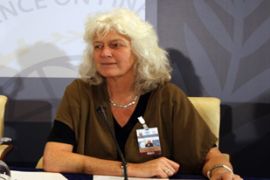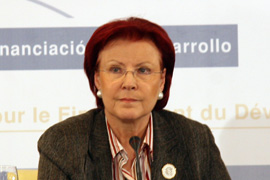UN summit ‘a missed opportunity’
Aid activists say rich countries could have done more to help the world’s poorest.

Borren also expressed disappointment that no progress was made on key Millennium Development Goals (MDGs) – including a commitment by developed nations to donate 0.7 per cent of gross national income (GNI) in aid.
‘Difficult’ negotiations
| In depth |
|
A guide to the Doha UN summit Market woes threaten UN aid goals UN aid pledges set to be broken? Developing nations seek IMF reform |
The European Union is the only bloc to have already committed to achieving 0.56 per cent of GNI by 2010 and 0.7 per cent by 2015. The US does not recognise the 0.7 per cent target as a concrete commitment.
Oxfam International, a leading charity organisation, also criticised the conference outcome document – which was the subject of intense and, sources say, often “difficult” negotiations over three days.
Ariane Arpa, the head of Oxfam International’s delegation in Doha, said the conference had been “long on talk but short on concrete outcomes,” particularly with reference to reforming the international finance institutions – the World Bank and the International Monetary Fund (IMF) and aid commitments.
There was no agreement on further reforms of both the bank and the fund to increase representation from developing nations.
“These negotiations have exposed deep divisions over the question of how to overhaul the international financial architecture … the fact the talks come close to breaking down demonstrates just how determined rich countries are to sidestep the UN, deny developing countries a voice in global financial talks and preserve their cosy little club,” she said.
Arpa also expressed concern at the omission of a commitment reached at the 2005 G8 summit in Gleneagles, Scotland to increase annual aid by $50 billion by 2010.
Tax evasion
The European Network on Debt and Development (Eurodad) condemned delegates “failure” to deal with tax evasion by multi-nationals operating in developing nations.
“The yearly $100 billion of aid to poor countries is dwarfed by the $500-800 of illicit flows from the south to the north, most of which is tax evasion by multi-national companies.
“This conference was an opportunity to address the rules of a system which has led us to the worst crash in decades, and rich governments have failed to take it,” Nuria Moline, Eurodad representative in Doha, said.
However, negotiators close to the negotiations said the outcome document preserves the pledges and spirit of Monterry, something they describe as a positive achievement given the current economic climate and the coming change of president in the US.
Some analysts have described the document’s call for action on tax evasion as a step forward.
Others say the outcome is far more positive than had been expected.
Timetables needed
 |
| Wieczorek-Zeul says the outcome document commits to creating timetables |
Heidemarie Wieczorek-Zeul, the German minister for economic cooperation and development and a Social Democrat MP, said the $50 billion aid target was still on track.
She said the only change was that the Doha document explicitly sets aside $25 billion for Africa.
Wieczorek-Zeul underlined that the conference itself could not bring about change as nation states were responsible for agreeing on their own budgetary arrangements and meeting promises they set down.
“It [the outcome document] is not a step back from Gleneagles … it is a reaffirmation … it is even far stronger than Monterrey when you look at things like timetables [for aid],” she said.
The document urges members to establish timetables for aid targets and to create transparent means of demonstrating how they were met and how the funds were allocated.
